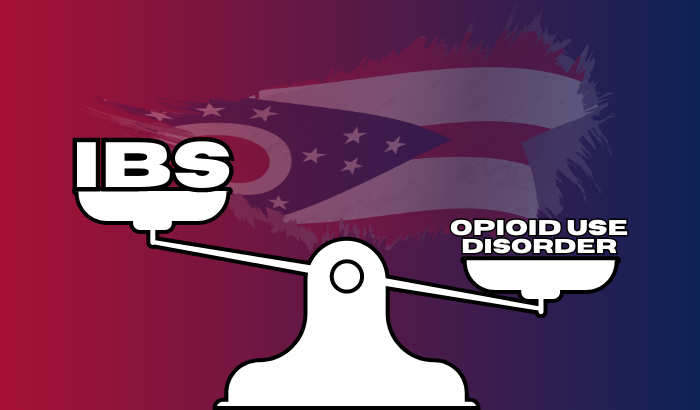
It’s a disgusting situation, but mainly because those with opioid use disorder and countless other conditions are still excluded from the program—not because of the explosive diarrhea
Here’s a sentence that is so ridiculous I read it four times, bleached my eyes, and fact-checked it twice before finally believing that the situation described herein really happened:
The State Medical Board made IBS the 26th qualifying condition for medical marijuana under Ohio law, and rejected obsessive-compulsive syndrome and autism spectrum disorder as qualifying conditions during Wednesday’s meeting.
Crazy as it seems and sounds, that’s the game of eenie meenie miney mo that some states are still playing with their medical programs. In Ohio, there are currently more than 25 recognized qualifying medical conditions, from AIDS, Alzheimer’s, and amyotrophic lateral sclerosis, to Tourette Syndrome, traumatic brain injury, and ulcerative colitis. Everybody else is out of luck, forced to plead their case and lobby for permission to obtain medication legally.
As the Ohio Medical Cannabis Industry Association’s director of government affairs told the Ohio Capital Journal this week: “While this addition [of IBS] will help expand patient access to medical marijuana and help many Ohio patients with this condition, we are disappointed the board did not approve autism spectrum disorder and obsessive-compulsive disorder.”
Meanwhile, lawmakers there are still kicking back and forth a bill that would add “autism, arthritis, migraines, spasticity or chronic muscle spasms, hospice care or terminal illness, and opioid use disorder to the list of qualifying conditions.”
You read that correctly—in Ohio, you still can’t get medical cannabis to help curb your heroin jones. All while the program also excludes medical delivery systems including “pills, capsules, suppositories, oral pouches, oral strips, oral or topical sprays, salves, lotions, or similar items, and inhalers.”
Needless to say, there’s no rec weed in Ohio to compensate for so much madness on the medical side. Cannabis advocates are pushing a ballot initiative while 420-friendly lawmakers have bills in play around adult-use as well as homegrow, but those campaigns hardly spell relief for Buckeyes whose problems aren’t acknowledged by their State Medical Board sticklers.
Not like Massachusetts is much better. The Bay State’s rec program makes for easy access for almost anyone, especially with delivery services available. While on the medical side, prescribing doctors have typically exercised significant discretion in finding ways to bend the rules for those who need meds.
Technically speaking, though, Mass medical rules are extremely restrictive. The program has been serving patients since 2015, but it was only last month that members of the Cannabis Control Commission endorsed “expanding the definition of ‘qualifying patient’ and ‘debilitating medical condition’ to help reduce financial burdens and barriers to medical marijuana access for Massachusetts veterans.”
Whereas “Qualifying patient” is currently defined by state law as “a person who has been diagnosed by a registered healthcare professional as having a debilitating medical condition,” CCC members—after years of urging from advocates—added the following description: “a veteran receiving their health care at a federal Veterans Administration facility.” It also took this long for the CCC to expand the definition of qualifying “Debilitating medical conditions,” which are currently cancer, glaucoma, positive status for human immunodeficiency virus, acquired immune deficiency syndrome, hepatitis C, amyotrophic lateral sclerosis, Crohn’s disease, Parkinson’s disease, and multiple sclerosis,” by adding “post-traumatic stress disorder, opioid use disorder, and other conditions as determined in writing by a registered qualifying patient’s registered healthcare professional” to the list.
Way to go, Mass, always two steps ahead of Ohio.

























